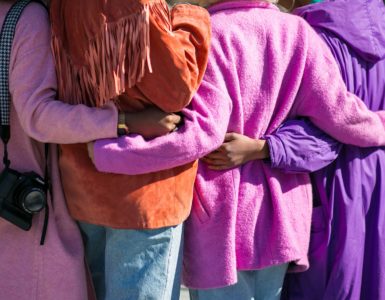Hello, San Franciscan expectant mothers/parents! I am here to give you the steps to navigate your way through the world of adoption should you choose to place your baby in San Francisco. But, first, let’s look at some fun facts you may not have known about your great city!
Ten Fun Facts about San Francisco
The facts I am using will be derived from the website onlyinyourstate.com. Some you might be aware of but others may surprise you!
- As of 2016, San Francisco had more dogs than kids — there were more than 10,000 more dogs according to Animal Control! That number has probably risen since then but the fact is still astounding!
- Did you know that the bear that is on the state flag was an actual bear named Monarch, one of the last grizzlies in California? That’s interesting too! It looks like an outline of a bear; that could be why you did not know that.
- The biggest prison in the nation is located here and Alcatraz was the only one to offer hot water to the inmates to try and dissuade them from jumping into the bay as a way to escape.
- San Francisco’s square mileage depends on whether you include Alcatraz or not. Now that is an interesting fact! The fact that they use a prison building to gauge how big the city is strange. If you use Alcatraz and/or Treasure Island, it is a little over 46 square miles. It doesn’t matter what you use, it is still just a little over 46 square miles.
- Levi Strauss invented denim jeans during the Gold Rush for the miners so that they were not only comfortable but had sturdy pants to wear.
- Candlestick Park was the place where the Beatles performed their last concert in 1966.
- Did you know that the fortune cookie was not invented in China? It was thought up by a resident of San Francisco. Have you noticed not a lot of things are made where we think they are?
- There are coffee houses everywhere in San Francisco. You probably passed one anywhere you went as there are 300 of them citywide.
- The Great Depression was a big deal but did you know that none of the banks in San Francisco closed during that time?
- Because the banks stayed open during The Great Depression, the Golden Gate Bridge and the San Francisco Bay Bridge were built at the same time to accommodate workers going in both directions.
What Does Adoption Mean for Expectant Mothers/Parents?
Adoption, especially if you are unexpectedly pregnant, can be a very scary word. Not knowing what it means or the steps you must take to place your baby can make that even more so. Adoption, as stated in the Merriam-Webster Dictionary, means a baby or child being raised by someone who is not biologically related to the child; raised as their own.
Reasons You Might Consider Adoption as an Option
If you decide to place your baby for adoption, there are many reasons why birth mothers/parents make that decision.
Some of these reasons could be:
- You are a teenager, and although you thought you were careful or that it could not happen the first time, you find yourself here. School, as a teenager, is already hard enough but you know that keeping your baby and being able to care for him/her would make it much more difficult.
- You do not believe in or support abortion but know that you cannot take care of a baby no matter your age.
- You are in college and, along with schoolwork and homework, are more than likely working at least part-time, if not full-time on top of that. You know that taking care of a baby is complicated even in the best of circumstances with their feeding schedule and being awake at night with them.
- You have finished college and started your career that you want to get a foothold on before starting a family.
Whatever your rationale for doing so, you are giving your baby the most selfless, loving gift you can, a chance at a life that you cannot provide. That is what adoption in San Francisco is about: aiding you, the birth mother/parents in knowing what steps to take.
Steps for Birth Mothers/Parents
- Making the Decision
The best decision for all involved when thinking about adoption in San Francisco is also the most difficult. But this is your first step when you are thinking about placing your baby for adoption. You want to make sure, if possible, that you have a support system set in place so you have loved ones and friends rallying around you at all times as you make this choice that will affect not only you but the baby you carry. In the end, it is about what is best for your baby and your gut instinct will tell you what you need to do.
- Finding an adoption agency and/or adoption attorney
Finding an agency that will fit your situation is not easy, not even when looking into adoption in San Francisco. You want to find one that will work well with you, the birth mother, and the birth father if he is still in the picture. An agency that gets talked about more and more is The Gladney Center for Adoption. They are not located in San Francisco but they are available to assist birth mothers/parents worldwide and if they are unable to help you, they can find an agency that is better equipped to handle your needs.
What does an agency do? They assist in a slew of areas that you might need help with like:
- Finding an obstetrician — you will want a “baby doctor” who can put your mind at ease as you go through your pregnancy. Such a doctor will be able to answer any questions you may have in regards to the changing of your body as your pregnancy progresses as well as what to expect afterward.
- Counseling — This is a major step when you decide to place your baby for adoption in San Francisco. A counselor can aid you in navigating the emotions you are sure to feel. During your pregnancy, and even afterward, you may experience the grieving process because, in a way, you’ve lost a part of yourself.
- Denial: When you first found out you’re pregnant, you might have gone through the phase of denial which is disregarding the fact that you are expecting as well as hoping that it’s “just a joke” and will go away without you having to do anything.
- Anger: Anger is an emotion you will feel many, many times throughout your pregnancy and even after. You may be angry at yourself for letting this happen, the birth father for not taking better precautions, or even God for allowing this to happen. You may find yourself in this area of the grieving process more than any of the others because anger is easier to deal with than hurt.
- Bargaining: You might find yourself attempting to make a deal with God that if He takes care of your situation, you promise something in return.
- Depression: You will most likely go through levels of depression while you are pregnant, to the point of isolating yourself from your family and friends, wondering if they have harsh feelings toward you because you “should have been able to stop it” or “you never should have done it in the first place.” This can last until long after your pregnancy is over. This is why therapy is so important even after it’s all said and done.
- Acceptance: This final stage is a difficult one to reach but once there, it makes the bigger picture easier to understand; knowing that you gave a family a gift they otherwise might not have had.
- Housing — if you have nowhere to stay and need a place while you’re pregnant, the agency can provide somewhere comfortable, safe, and suitable for a pregnant birth mother to get through your pregnancy. So, if you find yourself in need, do not hesitate to ask for help.
- Medical — The agency helps with some of the medical expenses that the prospective adoptive parents do not.
An adoption attorney retains a specialty in assisting birth mothers/parents when it comes to the legalities of the steps you take when placing your baby in San Francisco.
- Creating a birth and hospital plan
A birth plan is your first step when making decisions in your best interest and the best interest of your baby. Your birth plan consists of knowing which type of adoption you would like. In the United States, the most common is domestic adoption — this means that both the birth mother/parents and the prospective adoptive parents are from the United States. The subset types are ones you can agree to with the prospective adoptive parents.
- Closed Adoption: This was the type of adoption used the most before 1990. In it, the birth mother/parents do not know anything about where the baby ends up once he/she is born and given to the agency or the adoptive parents. This makes it more difficult for the child as they grow older and may want to find their birth mother/parents because, in most cases, the files remain sealed.
- Open Adoption: This type is still kind of new because it entails the birth mother/parents having some sort of contact with their baby as the baby grows up, at the discretion of the adoptive parents. This could be in the form of pictures, videos, letters, visitation, and even social media. If visitation is an option, this is generally set by the judge during the finalization of the adoption process.
- Partially Open/Closed: This one combines both of the other types where there are some aspects of the adoption the birth mother/parents are allowed to know and others they are not.
Making a hospital plan is where you get to decide who is in the delivery room with you as you give birth. There are some birth mothers who, if they have the support of their mothers, want them there. Others want the birth father with her so that they have a few minutes with their child to memorize how the baby cries, facial expressions, and make memories they can hold onto forever. Still, you may want the prospective adoptive parents there so they can experience as many aspects of the pregnancy and birth of the baby as possible. This is another decision that is left up to you.
- Choosing and meeting the family
This might be just as difficult as deciding to place your baby for adoption. Choosing your family used to be a bunch of paperwork in a folder with a few photos thrown in but now there is this thing called photo listing where you can see almost everything about the families you are interested in on a computer. You can scroll through several files within hours rather than days.
This is another area where placing your baby for adoption in San Francisco benefits from your intuition and using your gut instincts when making your final choice.
Meeting the family you choose can be daunting, to say the least. It can be nerve-wracking and scary because you are meeting strangers that you might hand your baby to. Communication is key and knowing some non-thought-provoking questions can aid in both sides becoming comfortable when opening up.
Some of these might include:
- How old were you when you met?
- What was your first instinct about each other? (This answer could elicit a giggle or two)
- What was your favorite date when you were young?
- What are your favorite date activities now?
- Do you like to ice skate/roller skate?
- What was your favorite subject in school (high school or college)?
- What was your least favorite subject?
These kinds of questions can be fun and a nice, easy way to break the ice.
- Deciding where life will take you afterward
Your life will look different now that you have gone through a pregnancy and a tough decision. What will you do now? Finish school? Get a job? Continue working? Whatever you decide, remember that therapy is extremely vital in your healing process and moving forward, so you will want to continue with that regardless of anything else you decide to do.
Now that you are in a different place in your life, can you look back on the decision you made to place your baby for adoption in San Francisco as a wonderful opportunity for not only you but your baby as well? This could be a great opportunity for you to share your journey with others just like you who are or have been where you are.
DISCLAIMER: Although this is a guide to assist expectant mothers in their choice to place their baby in San Francisco, please contact an adoption agency or adoption attorney for help.




